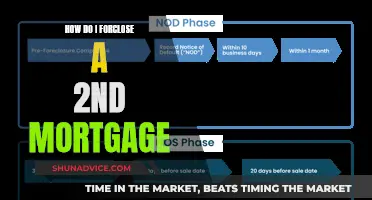
Many people don't know who owns their mortgage, and it can be complicated to find out. The company you send your mortgage payments to might not be the loan owner, as loans are frequently bought and sold in the mortgage industry. The owner of the loan is most often the investor — the entity that provided the funds for your mortgage. This could be the original party you transacted with, such as a bank, but it could also be another entity, like a pension fund or a real estate investment trust (REIT). The loan servicer, which is responsible for collecting monthly payments, maintaining escrow accounts, and distributing funds to other parties, is usually a separate entity from the owner of the loan. To find out who owns your mortgage, you can use online tools such as the Fannie Mae and Freddie Mac lookup tools, or the Mortgage Electronic Registration Systems (MERS) website. Alternatively, you can contact your mortgage servicer or send a written request to your mortgage servicer asking for information on who holds your loan.
| Characteristics | Values |
|---|---|
| How to find out who owns your mortgage | Check your monthly mortgage statement or coupon book for the number of your mortgage servicer; use online tools to look up who owns your mortgage; use the Fannie Mae and Freddie Mac mortgage lookup tool on their website; look up your mortgage servicer by searching the Mortgage Electronic Registration Systems (MERS) website; send a written request to your mortgage servicer asking for the name, address, and telephone number of the owner of your loan |
| Who owns your mortgage | The owner of the loan is most often the "investor", the entity that provided the funds for your mortgage; this could be the original party for your transaction, such as a bank, but loans can be bought and sold, so the owner can change and could be anyone from a pension fund to a real estate investment trust (REIT) or other entity |
| Who is the mortgage servicer | The mortgage servicer is the institution that collects the monthly payments and performs loan management services for loan owners and homeowners; the servicer may or may not be the owner of the loan |
What You'll Learn

Check your monthly mortgage statement
Your monthly mortgage statement will have the details of your mortgage servicer. The servicer is responsible for collecting monthly payments from you, maintaining your escrow accounts, and distributing funds to other parties, including local tax authorities, insurers, and the owner of the loan. The servicer may or may not be the owner of the loan. Loans are frequently bought and sold in the mortgage industry, and the company you send your mortgage payments to might not be the loan owner.
Your mortgage statement will have the contact information for your servicer. You can call them to ask who owns your mortgage. If they are not the loan owner, they are obligated to provide you with the name, address, and telephone number of the owner of your loan. You can also send a Qualified Written Request or a Request for Information to your servicer to ask for this information.
Your mortgage statement will also have details about your monthly payment amount, the next due date, and late fee information. If you are behind on your payments and want to find out about loss mitigation options, such as a loan modification, short sale, or deed in lieu of foreclosure, you can contact the loan servicer. Different backers offer various loss mitigation options, and your options depend on what entity owns or guarantees your loan.
Additionally, if you want to apply for assistance under your state's Homeowner Assistance Fund program, you can contact your servicer to find out if it participates. Remember that your mortgage loan may have been sold several times since you took it out with the original lender, so it's important to stay up-to-date by checking your monthly mortgage statement and keeping in touch with your servicer.
Finding Your Wells Fargo Mortgage Account Number: A Guide
You may want to see also

Use online tools like Fannie Mae and Freddie Mac's lookup tool
If you're looking to find out who your mortgage investor is, you can use online tools such as the Fannie Mae and Freddie Mac lookup tools. These tools can help you determine if your mortgage is owned or guaranteed by either entity.
Fannie Mae and Freddie Mac are investors that buy loans from lenders on the secondary market. They also guarantee some loans. To use their lookup tools, you'll typically need to provide your first and last name, address, and the last four digits of your Social Security Number. It's important to enter this information accurately, as mistakes or typos can lead to incorrect results.
If your loan is found in their database, you may be eligible for certain benefits and relief solutions, such as their respective Refi Possible™️ or RefiNow™️ programs, which can help you refinance your mortgage and lower your interest rate and monthly payments.
In addition to these tools, you can also try searching the Mortgage Electronic Registration Systems (MERS) website, as mortgages are often tracked in this system. MERS is a national electronic registry that tracks changes in servicing rights and beneficial ownership interests in mortgage loans.
It's important to note that the company you send your mortgage payments to may not be the loan owner, as loans are frequently bought and sold in the mortgage industry. The loan servicer, or mortgage servicer, is usually a separate entity from the owner of the loan. This servicer is responsible for collecting monthly payments, maintaining escrow accounts, and distributing funds to relevant parties, including the owner of the loan.
Is Your Mortgage Current? How to Check and Confirm
You may want to see also

Search the Mortgage Electronic Registration Systems (MERS) website
The Mortgage Electronic Registration Systems (MERS) is a database created by the mortgage banking industry to simplify the registration and transfer of mortgages. MERS is a privately held company that manages a confidential electronic registry of mortgages originated in the United States. It is designed to track the transfers of and modifications to servicing rights and ownership of the loans.
MERS offers a lookup tool that can help you locate the servicer and investor for your mortgage. To use the MERS lookup tool, you will need your mortgage identification number, which should have been provided by your mortgage lender. You can then call the Mortgage Electronic Registration System at 1-888-679-MERS (679-6377) for information about your account.
The MERS system is used by mortgage originators, servicers, warehouse lenders, wholesale lenders, retail lenders, document custodians, settlement agents, title companies, insurers, investors, county recorders, and consumers. County and regulatory officials and homeowners can access MERS free of charge.
It is important to note that while MERS can streamline the loan transfer process, it may not always be clear who owns the loan. This is because MERS replaces public recordation with a private one, making it difficult to determine the actual owners of home loans, especially during times of financial crisis.
Finding Homeowner Mortgage Details: A Property Guide
You may want to see also

Contact your mortgage servicer
Contacting your mortgage servicer is the best way to find out who your mortgage investor is. The mortgage servicer is the institution that collects your monthly payments and maintains your escrow accounts. They are also responsible for distributing funds to local tax authorities, insurers, and the owner of the loan. Many lenders sell the "mortgage servicing rights" to other entities, which then become the loan servicer. This is because managing loans day-to-day is beyond the capabilities or business model of many lenders.
You can find the contact information for your mortgage servicer on your monthly mortgage statement or coupon book. Once you have their contact information, you can call or write to them to request information on who owns your mortgage. Your servicer is obligated to provide you with the name, address, and telephone number of the owner of your loan. You can also use online tools such as the Mortgage Electronic Registration Systems (MERS) website to look up your mortgage servicer. MERS is a national electronic registry system that tracks changes in servicing rights and ownership interests in mortgage loans.
It is important to note that the company you send your mortgage payments to may not be the loan owner. The owner of the loan is most often the "investor", who put up the funds to make your mortgage happen. This could be the original party you transacted with, such as a bank, but loans can be bought and sold, so the owner can change over time and could be anyone from a pension fund to a real estate investment trust (REIT) or other entity. Therefore, it is always a good idea to contact your mortgage servicer to find out the most up-to-date information on who owns your mortgage.
Who Owns Your Mortgage Now? Find Out
You may want to see also

Send a written request to your mortgage servicer
If you want to find out who your mortgage investor is, one way to do this is to send a written request to your mortgage servicer. The mortgage servicer is the institution that collects your monthly payments and maintains your escrow accounts. They are responsible for distributing funds to other parties, such as local tax authorities, insurers, and the owner of the loan.
Your mortgage loan may have been sold several times since you took it out with the original lender, and the company that services your loan might not be the loan owner. The loan owner or investor is the entity that put up the funds to make your mortgage possible. This could be the original party to your transaction, such as a bank, but loans are often bought and sold, so the owner can change and could be anyone from a pension fund to a real estate investment trust (REIT) or other entity.
You can find the number for your mortgage servicer on your monthly mortgage statement or coupon book. You can then call them to ask who holds your loan, or you can send a written request. Your servicer is obliged to provide you, to the best of their knowledge, with the name, address, and telephone number of the owner of your loan. You can send a Qualified Written Request or a Request for Information. There is a sample letter online to help you write your request.
It's worth noting that, in some cases, your loan may be held by a digital management platform. MERS (Mortgage Electronic Registration Systems, Inc.) is a national electronic registry system that tracks changes in servicing rights and ownership interests in mortgage loans. MERS also offers a lookup tool that can help you locate the servicer and investor for your mortgage.
Finding Your Wells Fargo Mortgage Balance: A Guide
You may want to see also
Frequently asked questions
The owner of the loan is most often the "investor" or the entity that provided the funds for your mortgage. This could be the original party of the transaction, such as a bank, but loans are bought and sold, so the owner can change. The loan servicer is usually a separate entity from the owner of the loan. You can find the number for your mortgage servicer on your monthly mortgage statement and ask them who holds your loan. You can also look up your mortgage servicer by searching the Mortgage Electronic Registration Systems (MERS) website. Many mortgages are owned by Freddie Mac or Fannie Mae, and both offer a mortgage lookup tool on their website.
A mortgage "investor" purchases home loans that lenders originate. For example, Fannie Mae and Freddie Mac are investors that buy loans from lenders on the secondary market.
The mortgage servicer is the institution that collects the monthly payments. They are responsible for maintaining the escrow accounts and distributing funds to other parties such as local tax authorities, insurers, and the owner of the loan.
Yes, in some cases, the loan owner is also the servicer. However, this is usually a separate entity.
Most homeowners do not need to know who owns their home loan until they have a problem, such as needing to renegotiate the loan terms or arrange a short sale. Different investors offer various foreclosure alternatives, so your options depend on what entity owns or guarantees your loan.







